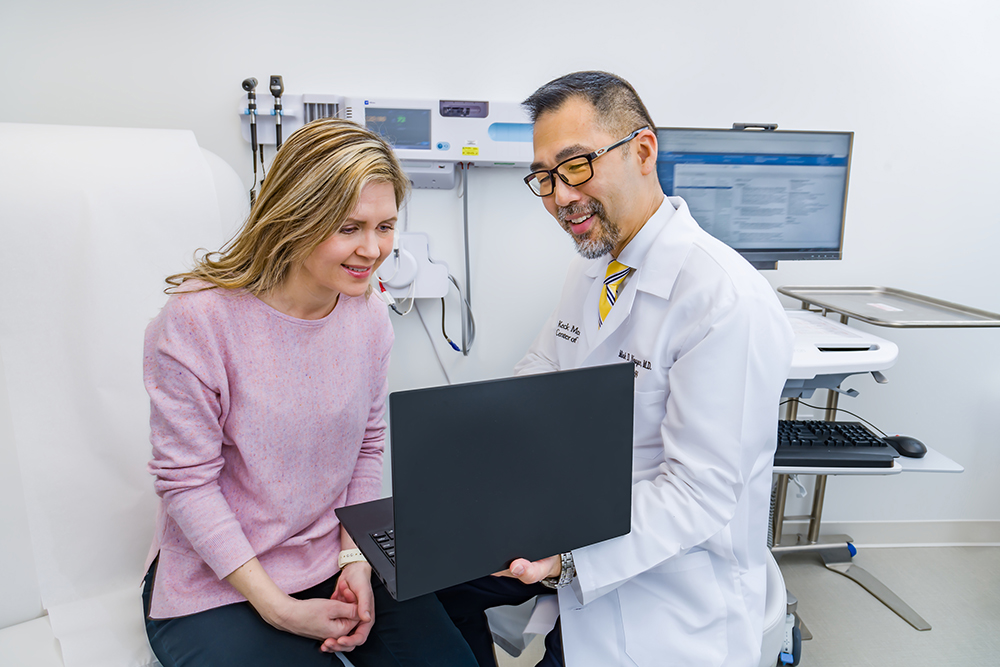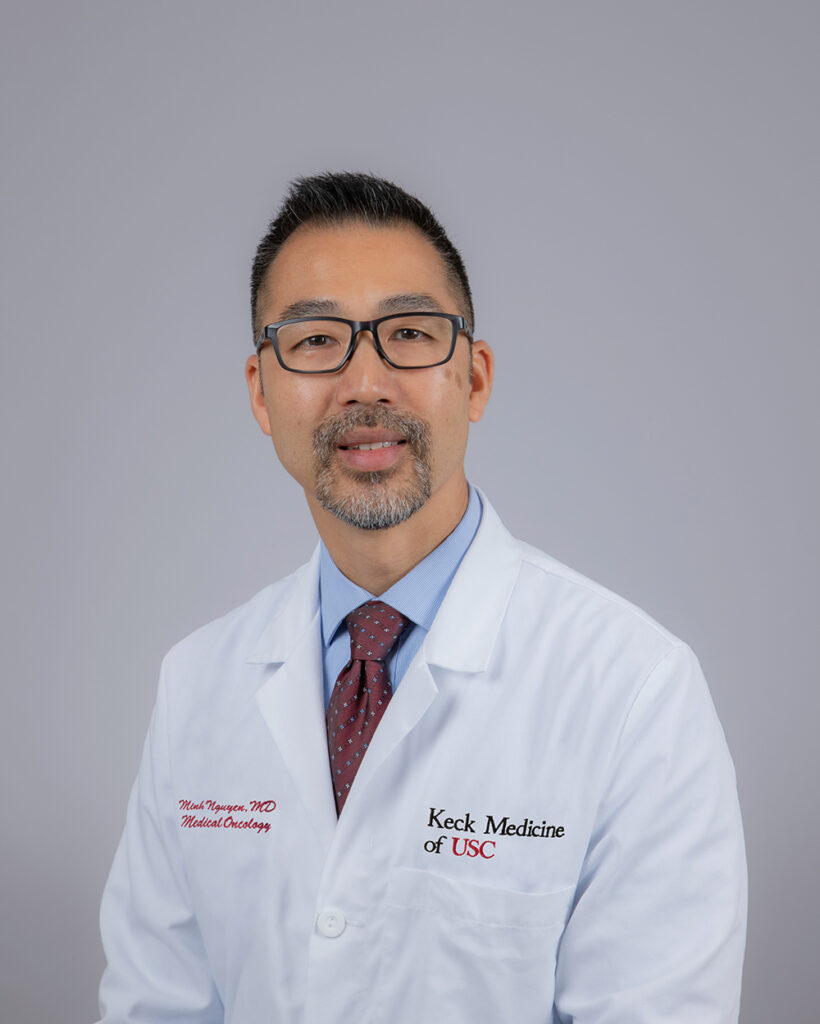
Second opinions in health care can be valuable for many reasons, says a Keck Medicine of USC oncologist.
Not all physicians welcome hearing that their patient wants to seek a second opinion from another doctor. There are, however, many reasons why second opinions can be valuable — not only to the patient but to physicians themselves.
How many patients get a second opinion?
“It’s actually not that common,” says Minh D. Nguyen, MD, a medical oncologist for USC Norris Comprehensive Cancer Center, part of Keck Medicine of USC. He estimates that 5%-10% of his patients will pursue a second opinion. But he also points out that some patients might not tell him they’re getting a second opinion, so he might not know if they do. Conversely, Nguyen estimates that 10% of his current patients are other physicians’ patients coming to him for a second opinion.
Patients are more likely to seek a second opinion when faced with a life-threatening disease, he says. “These patients are not afraid to ask for a second opinion because they want to be sure they’re making the right choices,” he explains.

Generally, patients seeking second opinions fall into one of two categories. “There are usually two types: patients who have received a brand-new diagnosis, or patients who have been diagnosed with a disease for a long time and whose disease is still progressing even though they have been through a lot of treatment. These patients usually come to me to try to gain any new ideas for treatment.”
“But again,” he says, “I’d say that second opinions don’t happen frequently.”
The benefits of a second opinion
When second opinions do happen, there usually isn’t a drawback.
First off, Nguyen says, “Doctors are humans, too.” Double-checking a physician’s diagnosis and treatment plan is never a bad idea.
Nguyen himself welcomes his patients gaining second opinions for several reasons. First, if a patient’s disease is rare or complex — one without a long-established standard of care — obtaining another doctor’s input can be helpful. In those cases, he says, “I think it’s important to get other opinions.”
“If a patient has a rare type of tumor, or a rare leukemia or lymphoma, for which there isn’t a standard of care, getting a second physician’s insight can open other treatment pathways I hadn’t considered,” he continues. “We can evaluate and compare our recommendations to help the patient decide which approach they prefer. I can say, ‘These are the reasons I recommended this, but I can see why the other doctor recommended that.’”
When patients do seek a second opinion from him, he tries to evaluate each case with fresh eyes. “If it’s a new diagnosis, I tell the patient not to tell me what the other doctor said. Let me look at your data and formulate my own opinions objectively. After that, you can tell me what the other doctor said, and we can compare notes.” But if a patient’s disease is very complex or advanced, then it helps to hear the other doctor’s history of diagnosis and treatment at the start before forming his recommendations.
In either case, he remains neutral when delivering his own recommendations. “Number one, I don’t want to say any bad or good things about the other doctor; I want to remain neutral,” he explains. “And number two, I don’t want the patient to feel like they didn’t get the right care.”
Finally, another reason consulting with another provider can be helpful is that the provider might know of a clinical trial that could benefit the patient. “I would certainly encourage patients to see what other trials are out there,” Nguyen says. “Oftentimes, I’ll look for open trials for patients — either here at Keck Medicine or elsewhere. If I see a clinical trial somewhere else that looks promising, I’ll tell them, ‘Why don’t you get a second opinion with those guys?’”
Second opinions can be reassuring
Nguyen finds second opinions helpful because they can validate his original recommendations to a patient. “Personally, I welcome them because, the majority of the time, the second opinion will come back saying what I said,” he notes.
“A lot of the common tumors we treat like breast cancer and colon cancer — we see those cases all day long, and they have standard protocols and straightforward pathways already established nationwide that most doctors agree on,” he continues. “So, when another doctor provides their second opinion, it will reinforce my own recommendation to the patient, and it will give them more confidence in the treatment plan. It will allow them to be more at peace with the plans we’ve discussed because another physician has independently recommended the same thing.”
If both doctors’ treatment plans are valid and would be equally effective, it can be left to the patient to decide which they prefer. “If the patient decides to follow a different treatment recommended by another doctor, but it’s still an acceptable treatment pathway that I can provide, I don’t have anything against that,” says Nguyen. “I’m more than happy to administer that treatment.”
When doctors push back
Nguyen says he will dissent when he doesn’t believe an alternative treatment will work.
The most common example are holistic treatments. “I tell the patient I don’t have data to support those holistic treatments. If they want to undergo those treatments in combination with the treatments I’m proposing, and as long as those holistic treatments aren’t damaging, I’d be okay with it — but I won’t provide those holistic treatments myself. The patient would have to go to a holistic doctor for that.”
Another time he might dissuade a patient from seeking out a second opinion is when a patient needs to start treatment right away.
“I do welcome second opinions as long as there is time for it,” he explains. “If there are diseases that are very aggressive, moving at a fast pace and I think we they need to get on treatment right away, I’ll tell the patient, ‘I don’t know that you have time for a second opinion. You need to start treatment. You can still seek that second opinion but do it after you start treatment.”
“As long as there is time for getting second opinions, however, I encourage it,” he says. “I tell the patient we can start treatment in the next three or four weeks. There’s time. Go ahead, go over there and get an opinion, then come back and let me know what you find out.”
Not all physicians encourage second opinions
Some doctors do get offended when their patients want a second opinion from elsewhere. “It happens,” Nguyen says. “I’ve had patients come to see me for a second opinion who have said, ‘My doctor wasn’t happy I’m getting a second opinion. They told me if I do so, don’t come back. If you walk out the door, keep walking.’”
For the most part, however, he believes most physicians do welcome patients getting second opinions. And if a patient wants one, he believes it’s in everyone’s best interest to be as helpful as possible.
He offers to review lists of other physicians his patients are considering seeing and will provide feedback on who he thinks would or wouldn’t be the best fit. “If you’re going to take time to get a second opinion,” he says, “then get it from the best of the best.”
Most of the time, his patients will consult him when they’re thinking about getting a second opinion. “They’re very forthright with me,” he says. “They’re not ashamed about it or scared to ask. A lot of that has to do with the physician-patient relationship. If they’ve known me for a while, they’re comfortable bringing it up and asking.”
That’s the way it should be, he says. “The diseases we deal with are life-threatening diseases, and you want the patient to be at peace with what they are doing. I think all physicians should encourage second opinions when the patient asks for it. The more you can put them at peace, the better the treatment will go.”
Topics
